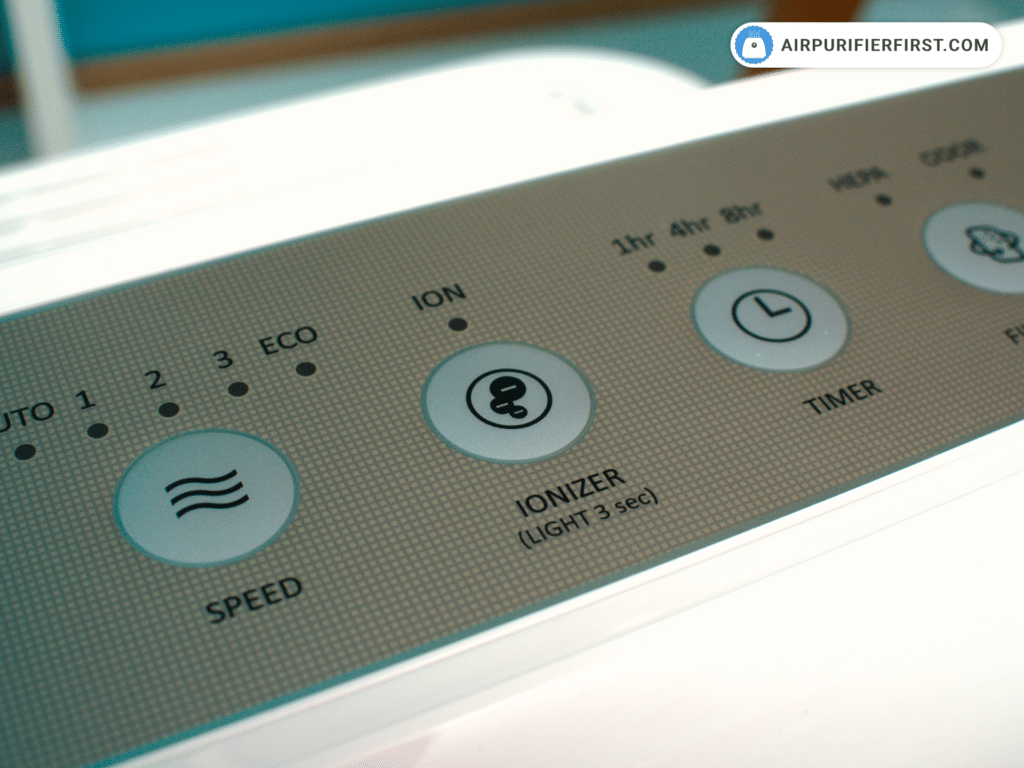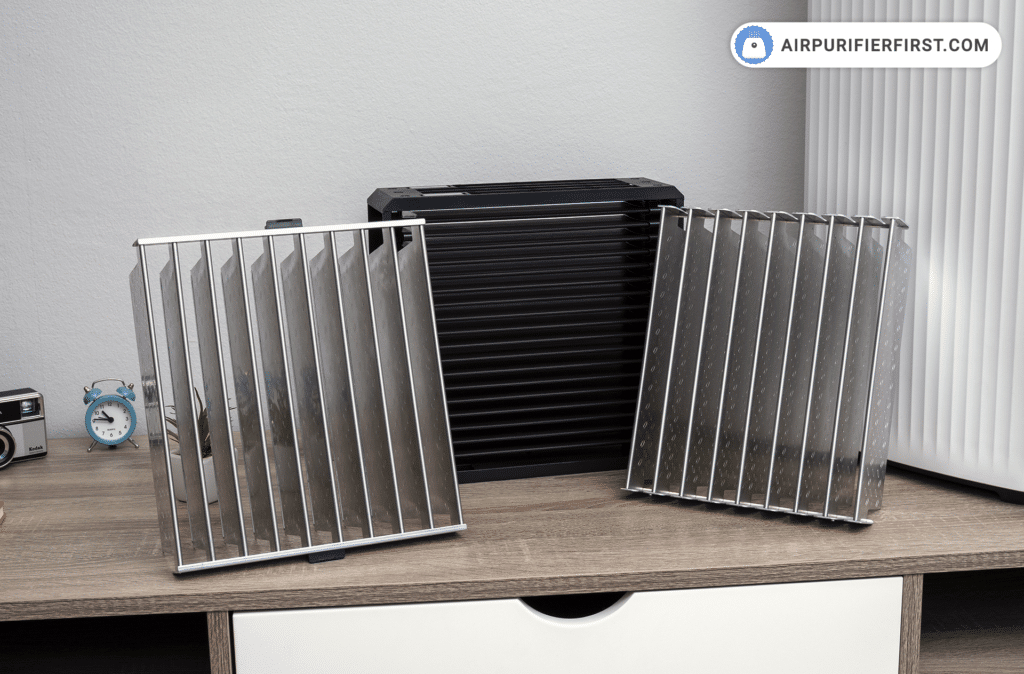An ionizer is a small device that uses high voltage to electrically charge particles in the air. These charged particles then adhere to walls, floors, and other objects in your home. It usually comes as a part of an air purifier or as a standalone purification system known as an ionizer air purifier.

Table of Contents
Understanding the real purpose and necessity of an ionizer in an air purifier can be quite confusing for many users. This confusion is mainly attributed to the lack of detailed explanations provided by brands about this technology. Therefore, I have written this article to answer various questions and clarify ionizers’ functionalities.
I have a feeling that the term “ionizer” is often misused, and this technology is sometimes marketed as a revolutionary addition to traditional air filtration systems in air purifiers, which may not always be the case. Nevertheless, I have personally tested numerous air purifiers that effectively use all the advantages of ionizers, delivering top-notch air purification. Combining my findings with research from reputable institutions (EPA) and scientists, I have written a comprehensive yet easy-to-follow explanation of ionizers.
Key Findings on What Is an Ionizer!
- Ionizers electrically charge particles in the air, causing them to adhere to surfaces in the room.
- In my opinion, the use of ionizers in air purifiers is often for marketing purposes and may not significantly improve air purification.
- Ionizers can filter small particles like tobacco smoke and small dust particles but are ineffective against larger particles like pollen and house dust allergens.
- Some brands have patented ionization-based filtration systems that have shown to be highly efficient; they are called collecting plates systems.
- Ionizers produce ozone, which can be harmful to health, and air purifiers with ionizers are restricted from sale in California unless CARB certified.
- The drawbacks of ionizers include ozone production, unpleasant odors, and ineffectiveness against large particles and VOCs.
- A traditional HEPA filter is often sufficient for air purification, and the need for an air purifier with an ionizer may not be necessary.
- The efficiency of a HEPA filter outweighs that of an ionizer, and the potential side effects of ionizers warrant caution and consultation with a doctor before purchasing one.
What Does an Ionizer Do?
As previously mentioned, an ionizer is a small device designed to electrically charge particles present in the air. Once charged, these particles are naturally drawn toward walls, floors, tabletops, draperies, and even nearby occupants. This fundamental mechanism forms the core function of an ionizer in an air purifier.
But why do brands use such devices in the first place? In my view, it’s mainly for marketing purposes. Simply put, why would someone use an ionizer when a True HEPA filter can effectively trap 99.97% of airborne particles as small as 0.3 microns? However, adding an extra feature like an ionizer can enhance the device’s appeal to customers and rationalize a higher price point.
In essence, not everything about ionizers is that negative. According to the EPA, ionizers can indeed filter certain small particles, such as those found in tobacco smoke, small dust particles, and similar. However, they don’t remove gases or odors and may be ineffective in removing larger particles like pollen and house dust allergens.
What’s also interesting is that some brands like Airdog and OneLife (which I had the opportunity to test) have patented an interesting air filtration technology that uses ionization in the first place. These brands have some kind of magnetic plates that attract particles produced by ionization. As a result, the air passing through the filter (plates) becomes ion-charged and sticks to the plates.

This technology has proven to be highly efficient, as I can personally attest after testing several models from Airdog and the OneLife X air purifier, all of which performed exceptionally well in all tests. I definitely suggest reading these ionizer air purifier reviews here on Air Purifier First.
On the other hand, some other popular brands like Coway, Winix, and Hathaspace use basic ionizers, which haven’t shown significant benefits in air filtration. For example, in my tests of the Winix 5500-2 air purifier, the difference in air quality improvement was less than 1% with the ionizer on/off. I also noticed that Levoit released several new models with the ionizer feature. Still, I’m honestly not sure why brands implement ionizers, especially considering that all of these brands already use high-quality HEPA filters, which are quite enough.
Moreover, it raises questions as to why brands continue to use this feature since ionizers are known to produce ozone, which can be harmful to health, particularly when inhaled in excessive amounts. Additionally, any air purifier equipped with an ionizer cannot be sold in California unless it is CARB certified. California’s regulations are famously strict and not easy to comply with.
Nevertheless, an ionizer can be helpful in removing small smoke particles, small dust particles, kill viruses, and may be beneficial, especially in areas affected by wildfire smoke.
What are the Benefits of Ionizers?
Still, whether we like them or not, ionizers have some positive aspects. These devices can effectively assist in removing small particles like small smoke particles, small dust particles, and mold spores from the air.
However, it’s crucial to recognize their limitations, as ionizers can’t handle larger particles and are, therefore, ineffective in dealing with them.
Furthermore, this research suggests ionizers can also help inhibit viruses, bacteria, and mold spores, leading to a healthier environment. Additionally, they may contribute to reducing stress levels, regulating sleeping patterns, boosting immune function, and supporting overall mood and well-being.
What are the Drawbacks of Ionizers?
The most significant and perhaps most concerning drawback of ionizers is the fact that these devices produce ozone. Although every air purifier I have tested so far emits ozone in allowed amounts, caution is still necessary. While ozone can be beneficial in eliminating microorganisms like viruses, it is also a significant lung irritant with numerous side effects, including throat irritation, difficulty breathing, increased asthma symptoms, and more.
Additionally, during my testing of certain air purifiers and based on numerous user comments, I observed that some ionizers can produce a very unpleasant odor, which is often intolerable.
Moreover, the fact that ionizers can’t remove large particles such as large dust particles, pollen, and similar means that these devices are ineffective in combating asthma or allergies. An air purifier with a HEPA filter would be much more suitable for that purpose.
Furthermore, despite their ability to remove very small particles from smoke and partially help neutralize small smoke particles from wildfire smoke, ionizers are highly ineffective in eliminating odors and gases. This means that ionizers can’t remove VOCs from the room. In fact, according to the research I linked to in the previous sentence, ionizers may contribute to an increased concentration of VOCs in the air.
Do You Actually Need an Air Purifier With Ionizer Built-in?
Honestly, I believe that an ionizer isn’t a must-have feature for an air purifier, mainly because a traditional HEPA filter is perfect for removing small particles from the air.
Furthermore, after testing air purifiers with the ionizer feature, I noticed no significant differences in performance during the tests or substantial improvement in air quality in the tested rooms.
Final Thoughts
Ionizers are devices that release negative ions into the air, which then attach to particles, causing them to stick to walls, fall to the floor, and adhere to other objects in the house. These small devices can also remove small particles, killing some viruses and mold spores.
However, the fact remains that a HEPA filter is several times more efficient than an ionizer. This raises the question of whether an ionizer is necessary for an air purifier that already uses a HEPA filter. When considering the side effects, such as ozone production, it is important to consider and consult a doctor before purchasing an ionizer.
Leave a Reply